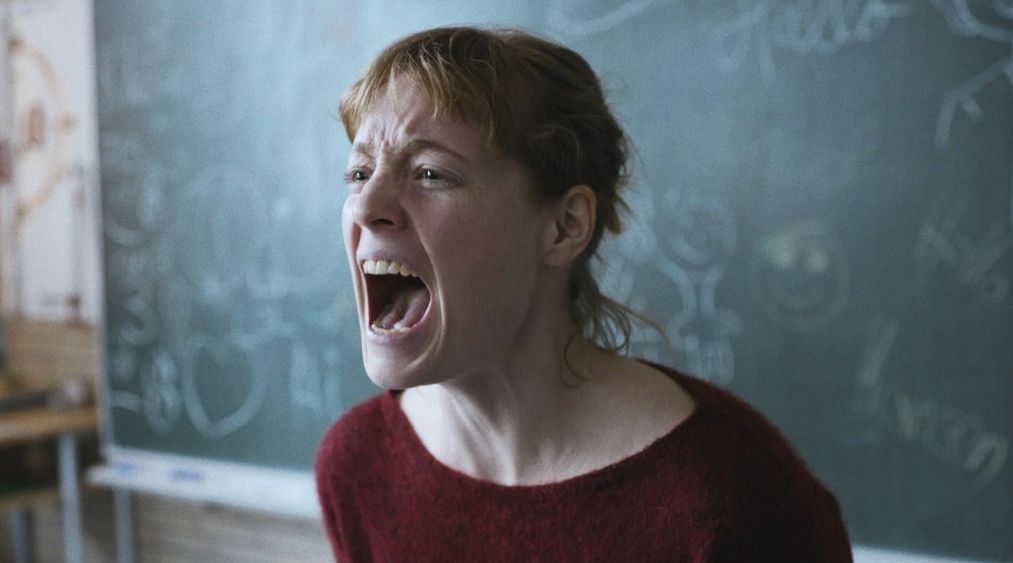Every one of us was raised by flawed people doing their best in some way or another. Parents, teachers, and other role models alike, not a single one of them was perfect, and no matter how hard they tried, no matter how we idealized them or they idealized themselves, they could not help but raise us with those flaws and all. We’re all part of an endless chain of flaws passed down from generation to generation. Within the glassy corridors and fancy libraries of writer/director Ilker Çatak and writer Johannes Duncker’s German-language film The Teacher’s Lounge works one such human being. Carla Nowak (Leonie Benesch) is fairly new to teaching 6th grade at her school, and perhaps more ardently and more successfully than anybody else at her school; she is trying her absolute best to pass on good, flawless lessons to her students.
But that is impossible. In her pursuit of the zenith of flawless education, she is blind to the great harm she’s inadvertently issuing upon her students. When a string of petty thefts turns the rest of the faculty into blunt objects of reactionary and outsized discipline, Nowak stands idly by. She offers only meager condolences or suggestions that her students do not have to participate in the outright interrogations and frisking that the other teachers and administrators are conducting. She knows what is happening is wrong. Every student in her classroom knows it’s wrong. Yet, perfect teachers don’t make a fuss when their colleagues and superiors are committing gross injustices against their students, apparently.
I would normally instantly hate a movie about adults sincerely thinking they’re helping kids but are unrepentantly harming them. But The Teacher’s Lounge’s rousing success is because it subverts the standard notion of a protagonist and antagonist as good guy and bad guy. While Nowak is the movie’s protagonist, she isn’t its hero. Her students are. And through their refusal to remain beholden to the school’s narrative and their teacher’s role in it, we can grapple with all of Ms. Nowak’s flaws more clearly.
From the very beginning, Ms. Nowak is shown controlling her classroom with precision and kindness. A clapping command captures everyone’s attention on the first try every time. She employs the Socratic method impeccably to let her students argue out loud about classwork and personal issues alike. It’s a remarkable initial demonstration of wisdom over the minds of 6th graders and the empathy required to support them in this especially volatile time in their teenage lives. However, at the very first sign of trouble, Ms. Nowak completely falters.

When the first of her students is accused of stealing, she does not stand up for him. She doesn’t tell the other faculty more than a time or two that she finds their methods disturbing. She doesn’t tell them that she would prefer to give the student the benefit of the doubt or allow him the chance to explain himself. Given how fairly and kindly she seems to treat her students otherwise, these are some of the most basic expectations you’re set up to hold Nowak to. She continues to make grave mistakes regarding who she defends and who she accuses, all clearly in the interest of protecting her students. But it all goes increasingly poorly with myopic tactics and a rush to get everything over with.
But again, where The Teacher’s Lounge could easily make a turn and shift the movie’s perspective to depict Ms. Nowak as the clear villain and her students as the true protagonists, we stick it out with Nowak the whole way through. In so doing, her fatal flaw is eventually revealed: anxiety. Carla Nowak, like so many of the rest of us, suffers from anxiety. And under this context, it’s evident why a new teacher, originally from Poland to boot, would be unable to stand up to her colleagues or her superior. It’s clear why, despite the painfully obvious right answer, she simply cannot bring herself to do it. We can be mad at her. We can dread how the movie dollies us backward down tight hallways while the score raises our heart rate. But we can also understand her perfectly.
Carla Nowak, like every person who has ever endeavored to improve young people’s lives, is flawed. And it’s a terrible shame because her flaws have irrevocably impacted her students for the worse. But no matter how they treat her in the aftermath of her worst mistakes, they still clearly maintain a level of respect for everything she’s done right by them. It’s evident in the penultimate scene.
And in the final moments, reveling in the indomitable and incorruptible spirit of youth, we know that these kids will be alright. They’ll move on from this chapter like we all do, taking on the flaws of other adults until one day, hopefully, they have the opportunity to pass their flaws on themselves. All we can do is our best and hope they turn out better than us despite our flaws. And, like at the end of The Teacher’s Lounge, we will simply have no way to know.
The Teacher’s Lounge is streaming now on Netflix.





